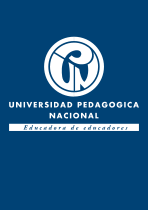Reflexiones sobre la didáctica de las ciencias sociales : aportes para los docentes que orientan la enseñanza de las ciencias sociales en los niveles educativos básico y media.

Citación
Fecha
2008-10-25Autor
Gutiérrez Abella, Sandra
Trujillo Losada, Milton
Enlace al recurso
https://revistas.pedagogica.edu.co/index.php/PYS/article/view/6881Metadatos
Mostrar el registro completo del ítemResumen
Los autores afirman que la finalidad de la enseñanza de las ciencias sociales no es formar científicos sociales ni expertos en una ciencia o disciplina. Lo que se enseña en ciencias sociales debe rebasar el conocimiento de las mismas y se encuentra ligado a la formación social de la escuela para que niños y adolescentes tengan herramientas necesarias para leer, interpretar, analizar críticamente y desarrollarse en la realidad en la que se hallan inmersos y trabajar para mejorarla. Así, pues, aquello que le interesaba a la didáctica clásica, que se remitía a los dispositivos metodológicos, debe ser replanteado, pues no sólo la condición postmoderna exige pensar en la información sino que el acontecimiento educativo implica otros elementos que no se habían tenido en cuenta, como el problema de las representaciones, de las transposiciones, que superan el problema de la conceptualización. Con todo, el interés de los autores de este texto ha sido plantearse cómo en el mundo educativo contemporáneo se puede repensar la didáctica de las ciencias sociales, con nuevos paradigmas y nuevas formas de enseñanza, adecuadas a la complejidad del mundo actual y fortaleciendo sus propósitos comprensivos y emancipadores del pensamiento crítico-social. En este orden de ideas, es fundamental que este texto sea un referente de reflexión para los docentes de ciencias sociales acerca de sus prácticas educativas y su formación disciplinar.
Abstract
The authors affirm that the purpose of the teaching of the social sciences is to form neither social scientists nor experts in a science or discipline. What it is taught in social sciences must exceed the knowledge about them and it's found tied to the social formation of the school so that children and adolescents have the necessary tools to read, to interpret, to analyze critically and to develop in the reality in which they are found immersed and to work to improve such reality. Hence, the one thing that interested to classical didactics, that was remitted to the methodological devices, should be redefined, since not only the postmodern condition requires to think about the information but the educational event implies other elements which had not been kept in mind, as the problem of the representations, of the transpositions, which exceed the problem of the conceptualization. With all, the interest of the authors of this text has been to discuss how, in the contemporary educational world, it is possible to think over the didactics of the social sciences, with new paradigms and new forms of teaching, adequate to the complexity of the present world and strengthening the emancipating and comprehensive purposes of the critical-social thought. In this order of ideas, it is fundamental that this text is a model of reflection for the teachers of social sciences about their educational practices and their formation to discipline.
Editorial
Editorial Universidad Pedagógica Nacional
Fuente
Colecciones
- Pedagogía y Saberes [660]
